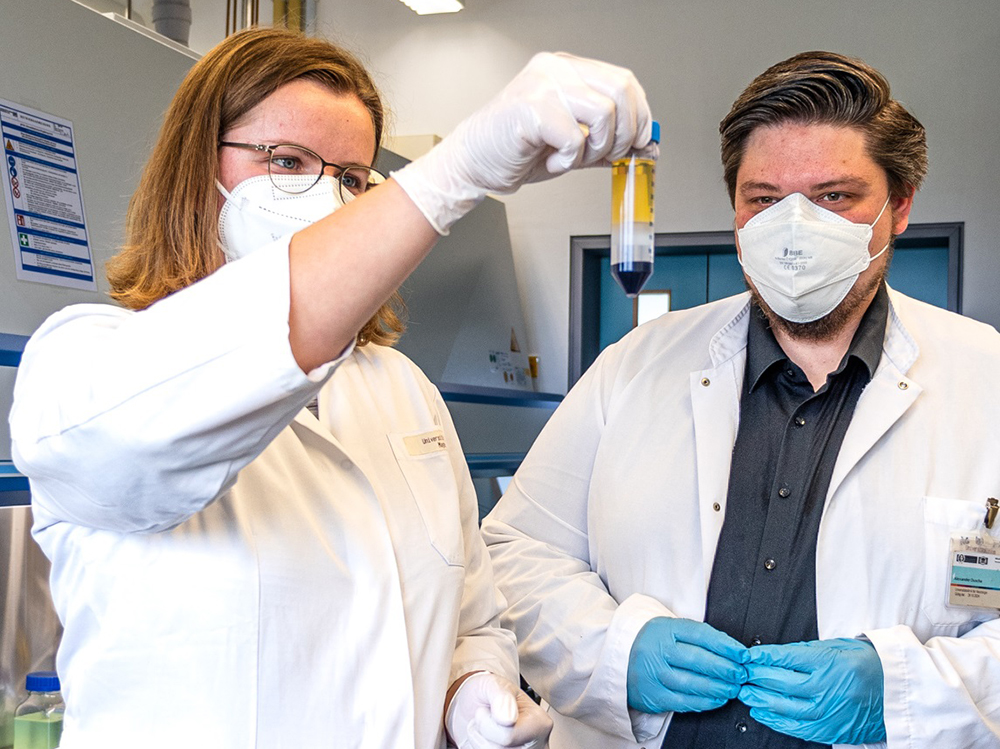The Importance of Gut health for the Brain and Body
Scientists at the University of Magdeburg are investigating the influence of intestinal bacteria on the development of chronic inflammatory and neurodegenerative diseases such as multiple sclerosis (MS) and Parkinson's disease.
The intestine, in which a good two kilograms of different bacteria cavort, not only influences digestion, but also our brain function and is an important modulator of our immune system. The research group "Translational Neuroimmunology and Neurodegeneration" at the University Department of Neurology in Magdeburg, headed by Prof. Aiden Haghikia, is investigating the influence of nutrition and the gut microbiome on the mechanisms that lead to the death of brain nerve cells in chronic inflammatory and neurodegenerative diseases such as multiple sclerosis (MS) or Parkinson's disease. The knowledge gained will be used to develop innovative therapies.

Photo: PhD student Antonia Lipp and Alexander Duscha are part of the 10-member research team in the Neuroimmunological Research Laboratory at the University Hospital for Neurology Magdeburg. The scientists' work includes isolating peripheral immune cells from patients' blood.
Photographer: David Dettbarn/UMMD
"Despite decades of intensive research, many neurological diseases are readily treatable, but unfortunately remain incurable. It varies greatly depending on the disease and is only known in part what ultimately leads to the death of the nerve cells. In MS, for example, a whole range of different components such as genetic factors, environmental influences and the individual lifestyle, i.e. diet or whether someone is a smoker, can represent potential risks," explains Prof. Haghikia and emphasizes the challenge facing his team: "The brain is one of the most complex structures of the human body, which is hardly accessible or can be studied from the outside. Interactions between autoimmune immune cells and brain tissue, as in the case of MS, are not easy to reproduce. In addition, studying the interaction of two very different organs such as the brain and the gut, which would not normally be assumed, is also a major challenge in the laboratory."
Using imaging techniques such as MRI as well as biological and immunological analyses, the scientists identify signaling pathways and cells in patients that are relevant for the course of the disease and test innovative treatment approaches in established model systems based on the findings. The research group's management team, consisting of Christiane Desel, Tobias Hegelmaier and Alexander Duscha, works together with a team of 10 young scientists. Alexander Duscha explains the first results of the scientific work: "We have studied fatty acids as an important component of Western nutrition and were already able to describe in 2015 that the length of fatty acids can promote the development and proliferation of inflammatory or regulatory immune cells in the intestinal wall. Now, in a study, we have been able to demonstrate a deficiency of the immunoactive, short-chain fatty acid propionic acid in patients with MS." According to the neuroscientists, if propionic acid is now used as a dietary supplement in addition to the immunotherapy applied, the patients affected showed a positive influence on the number and function of regulatory T cells, which play an important role in the regulation of autoimmune inflammatory reactions in the course of the disease. "In addition, we were able to observe a reduction in tissue loss in the brain and a stabilization of the individual course of the disease when propionic acid was taken for several years," he explains further.
These findings are now being transferred to other neurological diseases and intensively studied in current research projects. The team uses a variety of molecular and immunological methods to process human material, such as the isolation of peripheral immune cells from the blood of patients. "For our research work, so-called flow cytometry is also used very frequently. Here we can determine, for example, the type, number, ratio and function of various immune cells in the blood, cell culture dish and/or tissue of patients and use this to test the effect or efficiency of novel treatment options."
Scientific Contact:
Prof. Aiden Haghikia, Director of the University Hospital for Neurology, Mail:
Tobias Hegelmaier, Resident/Clinician Scientist at the University Department of Neurology, Mail:
Alexander Duscha, Christiane Desel, Head of the Neuroimmunology Laboratory of the University Department of Neurology, Mail: ,






